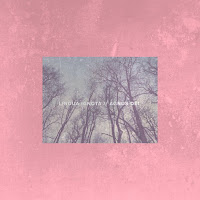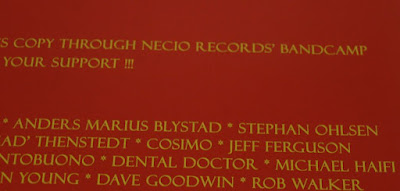My favorite post rock band is dropping a new album in September!
The follow-up of the sensational "Invisible City" has already been around on Bandcamp since October 2020, yet I bravely withstood the temptation to immerse myself in it until a vinyl version was on the horizon.
So you can for sure expect me to show off my copies of both albums in a future post.
Now however let's turn one ear to Japan and the other to China and focus on what we can hear!
First of all a bit of advice I wish I could take to heart more consequently myself for anyone reviewing music: Just don't fucking read the promotional texts! In case of this album it could make you search for influences which - if they are even there at all - are present to a much smaller degree than suggested.
It is true that Mono are incorporating more electronic elements, but to talk of "faster tempos that are clearly influenced by disco and techno" seems like a sensationalistic exaggeration to me.
I'm not saying you shouldn't dance to the beat of "Imperfect Things", but at its core this is all still very much at home in post rock. So instead of Zement abducting you into the 90's Berlin club scene it's actually rather a closer approximation to Wang Wen's style of recent years which you can witness on "Pilgrimage Of The Soul".
Where I will definitely agree with the promo is that this album may indeed be the most dynamic and diverse the Japanese intrumentalists have ever done. Which in itself already is quite an accomplishment, when you already have over twenty years and ten albums worth of some of the most monumental escapism soundtracks under your belly.
The amazing changes between breathingly light and devastatingly heavy are all still there, just as the larger than life guitar layers and occasional glockenspiel, strings and grand pianos. The new grooves and synthetic textures which are around for maybe a quarter of the total playing time, only add to the scope and colour palette of the album's grandiosity in a fresh way.
With Mono's previous studio album "Nowhere Now Here" as well as their last two EPs having reached a level of production quality, which seems impossible to improve, just as there is no further cumulation of pure classical orchestral elements in the cards than on the latest live album, this broadening of the palette undoubtly is a logical creative decision.
And boy how it pays off! Because as much as it doesn't even seem believable at this point, the quartet may very well have outdone themselves yet again. The enormous climax and epilogue of "Innocence" or the incredibly deep, moving, hopeful and melancholic double finale of the all-trademarks-on-board epic "Hold Infinity In The Palm Of Your Hand" and the piano and strings ballad "And Eternity In An Hour" alone catapults "Pilgrimage Of The Soul" into spheres most artist will never even come close to.
Of course this won't become everyone's favorite Mono work - and it's too early for me to put it into perspective with everything else I know from them either -, but it will surely and rightfully win them new fans and cement the observation that you should always expect the pinnacle of outstanding post rock mastery from this band.
Ultimately there's not much more to say, but all the more to just feel, while Mono lead you through a larger world inside of yourself. And if you think you've already grown accustomed to their special powerful grip of your primal emotions, "Pilgrimage Of The Sould" might still - even without actual oomphoomphoomph techno - very much surprise you!
If you seriously want to make my jaw drop to the floor and then nail it there for good, just record an album, which not only keeps up with Mono's "Pilgrimage Of The Soul", but which also immediately captures all my senses in an even more profound way. Enter Wang Wen!
While the base of their sound could easily be described as post rock closely related to Mono, but with not only Chinese instead of Japanese, yet also much more prominent traditional influences in it, there is still more to them. And as tempting as it still is for me to compare the two bands, it has probably never been as appearant as on "100,000 Whys" that Wang Wen have developed a completely independent identy.
Not only is the interplay of often morriconesque guitars and keyboards, with carefully dosed, albeit still irrestistibly addictive horn, trumpet or flute melodies elevating the traditional post rock game to a league of its own, but it's also part of a larger toolset, with which Wang Wen can surprise you with exotic sounds and effects or entirely stir away into any musical direction of their choosing whenever they want.
Subtle mood changes through alterations from acoustic to artificial percussions or a much more sudden full-on electronic extravaganza? A jazzy bassline here, a venture into prog rock there? Latin sketches or ominous vocal incantations?
It's all game, yet it's never too much or distracting from the very coherent, eminently hopeful and uplifting spirit of this album.
"100,000 Whys" is definitely easier accessible than "Eight Horses" and probably also than "Sweet Home, Go!" or "Invisible City", but that doesn't mean it's any less sophisticated.
Even though the music sometimes disguises itself as pure entertainment without a double bottom of deeper aspiration, going so far as calling one track just "Shut Up And Play", it's of course always a display of fantastic compositional thought and craftsmanship, realized with everyone playing the exact right thing at the right time to make it work.
It's an album that allows you to just lean back and let yourself be flooded by its magic, but also caters to you when you're in a more proactive listening mode, ready to detect all kinds of impressive, but never show-offy (in terms of technical wankery) way.
Everything about this is just so delicately balanced. The production is once again powerful, super clean and perfectionist, but never sterile. It just all works together so incredibly well.
How good is this going to become once I hold the actual vinyl artwork in my hands?
I don't even need to love this more than I already do.
Right now for me the only imaginable possibility of Wang Wen not having delivered the post rock masterpiece of the year would be if you counted "100,000 Whys" by its digital premiere as a 2020 release. But yeah... no... I love this band way too much to do so.

















